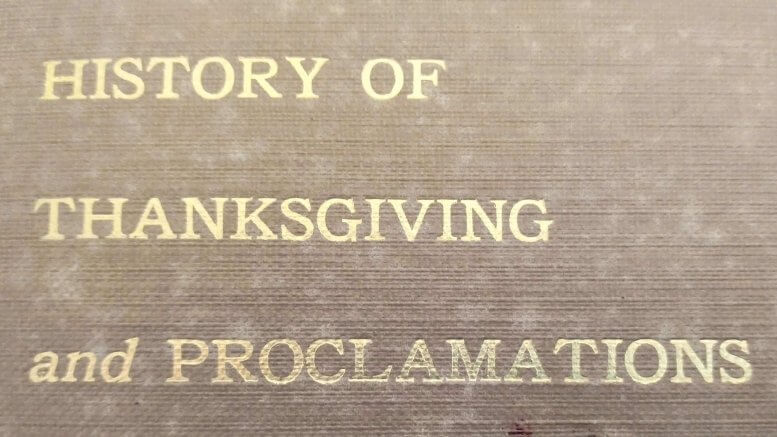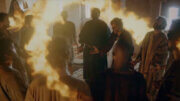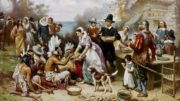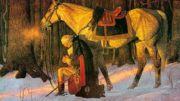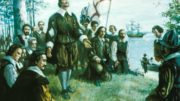Playback speed:
How he Promoted religious gratitude in both public and private
Mark A. Beliles | Transform Nation
As our nation observes the Thanksgiving holiday, it is interesting to note how our Founding Fathers, especially Thomas Jefferson thought of the practice.
Although any connection between government and religion is seized upon by social media today as a sign of dangerous “Christian Nationalism,” it was almost universally acceptable among America’s public leaders throughout our history.
The Spanish and French colonists in what is today U.S. territory observed public thanksgivings as early as 1540s. In the English colonies it was common as well in the 17th and 18th centuries. The London Company charter specifically required “that the day of our ships arrival at the place assigned for plantation in the land of Virginia shall be yearly and perpetually kept holy as a day of thanksgiving to Almighty God”. A notable observance in Virginia occurred in 1619 but the more famous one took place among the Pilgrims of Plymouth in 1621.
A book by H. S. J. Sickel of the Philadelphia Bar was published in 1940 entitled Thanksgiving: Its Source, Philosophy and History with All National Proclamations and Analytical Study Thereof. In it Sickel presents evidence of some colonial period proclamations but mainly highlights national ones, from the time of independence in 1776 up to the adoption of the U.S. Constitution in 1789 and thereafter up to 1940 when the book was published. It also includes some data on prayer and fasting proclamations. National Thanksgiving proclamations did not take place from 1816-1861 but otherwise have occurred annually almost without fail to this day.
In so many other ways throughout our nation’s history the connection between government and non-denominational religious expression in public life is voluminous. The 3-volume Church and State in the United States by Anson Phelps Stokes provides great documentation of such connections.
But Thomas Jefferson is especially interesting in this regard. Modern secularist scholars claim him to be opposed to any connections of religion and government. For a thorough evaluation of such claims see a book co-authored by myself and Jerry Newcombe entitled Doubting Thomas: The Religious Life and Legacy of Thomas Jefferson. [Order at this link]
I can document directly from his original writings almost 300 times that Jefferson expressed prayer to God either personally or publicly. But his public support of thanksgiving to God is worthy of remembering during this Thanksgiving holiday. A few examples are below (the excerpts here can be found in full context in my book).
First is his work in his state of Virginia. As a member of the legislature he was part of a Committee of Revisors that worked to change laws in Virginia after it became independent of British control. On June 18, 1779 the committee proposed one revision of the laws (along with the a bill for Religous Freedom, #82) as follows:
85. A Bill for Appointing Days of Public Fasting and Thanksgiving
_________________________
Five months later Jefferson, now serving as Virginia’s elected Governor, issued the following words that were his own (after copying verbatim the words of a proclamation by the Congress that spoke of the church, the gospel, the Redeemer and the Holy Spirit):
Proclamation Appointing a Day of Publick and Solemn Thanksgiving and Prayer, November 11, 1779
….I do therefore by authority from the General Assembly issue this my proclamation, hereby appointing…a day of publick and solemn thanksgiving and prayer to Almighty God, earnestly recommending to all the good people of this commonwealth, to set apart the said day for those purposes, and to the several Ministers of religion to meet their respective societies thereon, to assist them in their prayers, edify them with their discourses…
______________________
Later as President of the United States Jefferson made official messages such as below giving thanks to God:
First Annual Message to Congress, December 8, 1801
….whilst we devoutly return thanks to the beneficent being who has been pleased to breathe into them the spirit of conciliation and forgiveness, we are bound, with peculiar gratitude, to be thankful to him that our own peace has been preserved through so perilous a season….
_________________________
When religious leaders who were his friends and political supporters urged him to refrain from proclaiming a national day of thanksgiving, President Jefferson sought advice from his Attorney General. Unlike his own personal expression to Congress, or his own official proclamation in Virginia (seen previously above), a national proclamation would use the power of the presidency. Jefferson wondered if this (as his Baptist friends believed) would encroach on the authority of state governments, which he had no qualms doing earlier while Governor of Virginia. See below:
To Levi Lincoln THE ATTORNEY GENERAL, January 1, 1802
….The Baptist address [from Danbury, Connecticut], now enclosed, admits of a condemnation of the alliance between Church and State, under the authority of the Constitution. It furnishes an occasion, too, which I have long wished to find, of saying why I do not proclaim fastings and thanksgivings, as my predecessors [in the Presidency] did. The address, to be sure, does not point at this, and its introduction is awkward. But I foresee no opportunity of doing it more pertinently. I know it will give great offence to the New England clergy; but the advocate of religious freedom is to expect neither peace nor forgiveness from them….
____________________
Four years later President Jefferson in another letter to some Baptist friends who appreciated that he did not use his office to call for official days for prayer and thanksgiving, still sent an offical message to them that gave thanks to God:
To Baptist Churches of Chowan Association in North Carolina [Rev. George Outlaw, Rev. Lemuel Burkitt, et al], June 24. 1806
I have duly recieved the Address…of the several Baptist churches of the North Carolina Chowan association held at Salem, and I proffer my thanks for the favorable sentiments which it expresses towards myself personally….with gratitude to the being under whose providence these blessings are held. we owe to him especial thanks for the right we enjoy to worship him, every one in his own way, and that we have been singled out to prove by experience the innocence of freedom in religious opinions & exercises, the power of reason to maintain itself against error, and the comfort of living under laws which assure us that in these things ‘there is none who shall make us afraid.’….Be so kind as to present my thanks to the churches of your association, & to assure them of my prayers for the continuance of every blessing to them now & hereafter….
_________________________
After Jefferson retired to private life he would express thanks to God for various ways in which he saw God’s hand in national affairs. Although no longer official expressions of an agent of a governing body, they still are interesting to observe. An example is this letter to a Roman Catholic envoy of the Pope, and longtime personal friend:
To Rev. Antonio Dugnani, February 14, 1818
….renewing to you [Catholic Papal Nuncio in Rome] the assurances of the sentiments of friendship and respect engraved on my mind during our residence at Paris, and of their cordial continuance….A few days ago I received a letter from [Catholic Rev. Ambrose] M. Marechal, Archbishop of Baltimore, in which he informs me that…you had…made kind enquiries after myself and my family….During the terrible revolutions of Europe I felt great anxiety for you….and thanks be to God the tiger [i.e. Napoleon] who revelled so long in the blood and spoils of Europe is at length, like another Prometheus, chained to his rock….
__________________________
One of Jefferson’s last letters ever written just a month before his death, again expressed thanks to God:
To Jacob Taylor and Committee of the Corpor[atio]n of the city of N.Y.
June 8, 1826
….the few surviving signers of [the] memorable instrument which announced to the world the entrance of their country into the great family of nations owe indeed peculiar thanks to Providence for the preservation of their lives until they shall have seen the 50th return of that auspicious day….the most holy of all causes….
Jefferson’s public promotion of religion in public life occurred in multiple other ways as well (these are only a few connected to Thanksgiving) and certainly was not some dangerous “Christian Nationalism” – it was simply the normal Constitutional Americanism that many people today do not learn about. As we celebrate this year’s Thanksgiving, I suggest to take a few minutes between feasting and football and use the words of Jefferson’s 1779 Thanksgiving Proclamation (found in the subscriber section below) to offer a prayer for our nation.
And if you want to study Jefferson’s true religious life and legacy or give as gifts to others, see my publication website for great Christmas season deals at this link.

